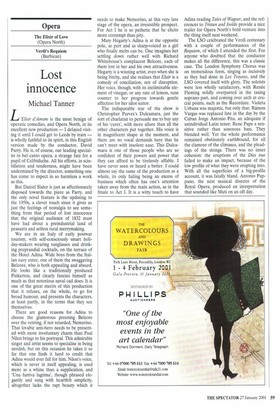The Elixir of Love (Opera North) Verdi's Requiem (Barbican)
Lost innocence
Michael Tanner
L'Elisir d'Amore is the most benign of operatic comedies, and Opera North, in its excellent new production — I delayed visiting it until I could get to Leeds by train — is wholly faithful to its spirit, in this English version made by the conductor, David Parry. He is, of course, our leading specialist in bel canto opera, a strange fate for a pupil of Celibidache. All his efforts, in scintillation and tenderness, might have been undermined by the director, something one has come to expect in so harmless a work as this.
But Daniel Slater is just as affectionately disposed towards the piece as Parry, and the only novel feature is the updating to the 1950s, a clever touch since it gives us just the feelings of nostalgia to see something from that period of lost innocence that the original audience of 1832 must have had about a preindustrial land of peasants and artless rural merrymaking.
We are in an Italy of early postwar tourism, with self-consciously smart holiday-makers wearing sunglasses and drinking preprandial cocktails, on the terrace of the Hotel Adina. Wide boys from the Italian navy enter, one of them the swaggering Belcore, who is both appealing and absurd. He looks like a traditionally produced Pinkerton, and clearly fancies himself as much as that notorious naval cad does. It is one of the great merits of this production that it refuses, on the whole, to go for broad humour, and presents the characters, at least partly, in the terms that they see themselves.
There are good reasons for Adina to choose the glamorous preening Belcore over the retiring, if not retarded, Nemorino. That lovable anti-hero needs to be presented with more involuntary charm than Paul Nilon brings to his portrayal. This admirable singer and artist seems to specialise in being nerdish, but on this occasion he takes it so far that one finds it hard to credit that Adina would ever fall for him. Nilon's voice, which is never in itself appealing, is used more as a whine than a supplication, and 'Una furtiva lagrima', though phrased elegantly and sung with heartfelt simplicity, altogether lacks the rapt beauty which it needs to make Nemorino, at this very late stage of the opera, an irresistible prospect. For Act I he is so pathetic that he elicits more contempt than pity.
Mary Hegarty's Adina is at the opposite pole, as pert and as sharp-voiced as a girl who finally melts can be. One imagines her settling down rather well with Richard Whitehouse's complacent Belcore, each of them lost in her and his own attractiveness. Hegarty is a winning artist, even when she is being bitchy, and she realises that Elixir is a comedy of conciliation, not of disruption. Her voice, though, with its ineliminable element of vinegar, or any rate of lemon, runs counter to her progress towards gentle affection for her idiot suitor.
The indisputable star of the show is Christopher Purves's Dulcamara, just the sort of charlatan to persuade me to buy any of his 'cures', with more allure than all the other characters put together. His voice is in magnificent shape at the moment, and there are no vocal demands here that he can't meet with insolent ease. This Dulcamara is one of those people who are so confident of their powers and power that they can afford to be tirelessly affable. I have never seen or heard a better. I could almost say the same of the production as a whole, its only failing being an excess of business which often has one's attention taken away from the main action, as in the finale to Act I. It is a witty touch to have Adina reading Tales of Wagner, and the references to Tristan and Isolde provide a nice trailer for Opera North's bold venture into the thing itself next weekend.
The LSO celebrated the Verdi centenary with a couple of performances of the Requiem, of which I attended the first. For anyone who doubted that the conductor makes all the difference, this was a classic case. The London Symphony Chorus was on tremendous form, singing as incisively as they had done in Les Troyens, and the LSO covered itself with glory. The soloists were less wholly satisfactory, with Renee Fleming mildly overparted in the taxing soprano part, and coming over arch at crucial points, such as the Recordare. Violeta Urbana was majestic, but only that; Ramon Vargas was replaced late in the day by the Cuban Jorge Antonio Pita, an adequate if unindividual Latin tenor; Rene Pape a sensitive rather than sonorous bass. They blended well. Yet the whole performance remained obstinately earthbound, for all the clamour of the climaxes, and the pleadings of the strings. There was no inner cohesion: the eruptions of the Dies irae failed to make an impact, because of the low profile of what they were erupting into. With all the superficies of a big-profile account, it was fatally bland. Antonio Pappano, the next musical director of the Royal Opera, produced an interpretation that sounded like Muti on an off day.






















































































 Previous page
Previous page